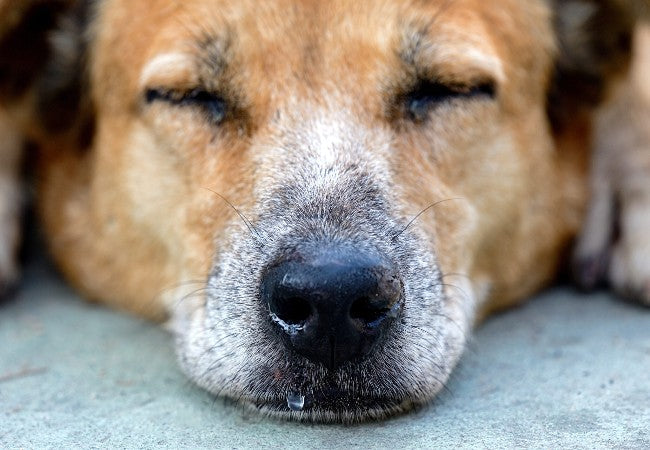A Vet’s Guide to Runny Nose in Dogs: Causes, Diagnosis & Care (2025) 🤧🐶

In this article
A Vet’s Guide to Runny Nose in Dogs: Causes, Diagnosis & Care (2025) 🤧🐶
By Dr. Duncan Houston BVSc
Hi—I’m Dr Duncan Houston BVSc, veterinarian and founder of Ask A Vet. A runny nose—rhinorrhea—is common in dogs, but can signal anything from mild allergies to serious illness. In this vet‑approved guide, we explore causes, signs, when to seek veterinary care, and how at‑home comfort tools like Ask A Vet telehealth. 🐾
1. What Is a Runny Nose?
Medically called rhinorrhea, a dog’s runny nose is nasal discharge. Occasional thin, clear discharge can be normal, especially from excitement or mild allergies. But persistent, colored, bloody, or thick discharge may indicate infection or injury and should be checked.
2. Common Causes of Runny Nose
- Environmental allergies (pollen, dust, mold)—cause clear discharge, sneezing, itchiness.
- Infections: viral (kennel cough, flu), bacterial, fungal, or distemper—often produce yellow/green discharge, cough, fever.
- Foreign body (grass seeds, debris)—may cause unilateral discharge, sneezing, pawing at nose.
- Dental disease—abscessed teeth can drain into the nasal passage.
- Nasal growths/tumors or polyps—persistent discharge, nosebleeds, facial swelling.
- Structural issues—brachycephalic breeds may have chronic mild discharge due to anatomy.
3. When to Worry
Seek veterinary care if nasal discharge is:
- Thick, colored (yellow, green, bloody, cloudy)
- Unilateral (only one nostril), with sneezing/pawing
- Accompanied by coughing, fever, lethargy, appetite loss, or difficulty breathing
Serious causes include infections like kennel cough or canine influenza, distemper, nasal tumors, foreign bodies, and dental abscesses—each requiring professional diagnosis.
4. Diagnostic Steps
- History & physical exam—profile snout, eyes, mouth
- Rhinoscopy for foreign bodies, masses
- Imaging (X-ray, CT) to assess sinuses, tumors, or obstructions
- Cytology/culture of nasal discharge to detect bacteria, fungi, parasites
- Dental examination under anesthesia if dental disease is suspected
- Lab tests for viral diseases like distemper, influenza
5. Treatment Approaches
For Allergies & Irritants
- Remove triggers—dust, smoke, strong odors
- Antihistamines/steroids as prescribed
- Saline nasal rinses and a clean air environment
For Infections
- Antibiotics for bacterial causes
- Antivirals/supportive care for viral causes (kennel cough, influenza)
- Antifungals for fungal rhinitis (e.g. aspergillosis)
For Foreign Bodies
- Removal via rhinoscopy under anesthesia
For Dental-Related Cases
- Dental cleaning/extraction and antibiotic coverage
For Tumors or Polyps
- Biopsy, surgical removal or radiation therapy
6. At-Home & Telehealth Support
- Ask A Vet App: Upload nasal discharge photos, vlogs, and symptoms for remote diagnostics and triage.
- Home care tips: Use saline rinses, keep areas dust-free, maintain hydration, and clean discharge with soft cloth.
7. Real Vet Case Study
Case: “Ruby,” 4‑year‑old Golden Retriever
Ruby had unilateral greenish discharge, sneezing, and pawing. Physical exam and CT found a grass awn lodged in her nasal cavity. It was removed under anesthesia, and she received a short antibiotic course.
8. FAQs
-
Is a clear, runny nose always OK?
Occasional clear discharge is normal, but persistent or frequent discharge warrants monitoring or vet check. -
Can dogs catch colds from humans?
No—dog viral infections are species‑specific, but they do get their own, like kennel cough or canine flu. -
What if my dog has bloody discharge?
This is a red flag—could suggest tumor, fungal infection, or trauma; immediate vet assessment required. -
How to prevent a runny nose?
Keep vaccinations current, watch for grass seeds, manage allergies, clean home air, and maintain dental health.
📌 Final Thoughts from a Vet
Runny noses in dogs range from harmless to serious. Careful observation of discharge, timing symptoms, environment, and overall health is vital. Prompt veterinary diagnosis—supported by imaging, cultures, and sometimes biopsies—guides effective treatment. In the meantime, tools like Ask A Vet telehealth. Stay observant, stay proactive, and help your dog breathe easy and healthy in 2025. 🐾❤️






